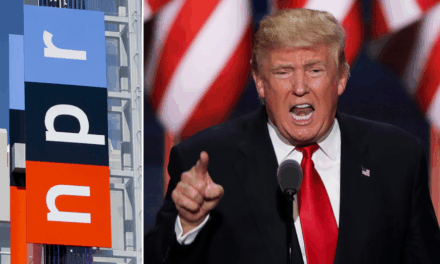In a recent segment that has sparked considerable discourse, CNN anchor Jake Tapper delivered a scathing critique of what he described as a media smear campaign against FBI Special Agent in Charge of the New York Field Office, Christopher Wray, particularly focusing on his colleague, Thomas Hur. Tapper’s remarks highlight an increasing concern over the ethical standards employed by some media outlets in their coverage of politically charged topics.
During a broadcast, Tapper pointed out that the scrutiny of Hur has escalated to what he termed “a witch hunt,” asserting that the coverage is often sensationalized and disconnected from the reality of the situations at hand. He emphasized the need for responsible journalism and a fair treatment of individuals serving in crucial roles, particularly those involved in national security matters.
Tapper’s comments come at a time when questions surrounding the integrity of media portrayals have become increasingly pertinent. He specifically noted a pattern in media narratives that appear aimed at undermining the credibility and reputation of law enforcement officials, particularly those connected with sensitive investigations. This aspect of partisan reporting has raised alarms among critics and advocates of media ethics alike.
“In this time of heightened scrutiny towards government institutions, it is vital that we hold the media accountable for how they present stories and the implications they carry,” Tapper stated. “When a storyline is slanted in such a way, it risks not only the careers of individuals like Attorney Hur but also tarnishes public trust in the institutions we rely on for our security and governance.”
While Tapper did not shy away from holding the media accountable, a recent report from the Wall Street Journal explored the deteriorating public perception of President Joe Biden. However, it notably refrained from critiquing its own role in shaping narratives about his administration. The report drew attention to various polls indicating a decline in support for Biden, attributing this drop to several factors, including economic challenges and policy decisions that have not resonated well with the public.
The Journal’s analysis provided a detailed examination of how many voters currently feel disillusioned with Biden’s management of key issues ranging from inflation to international relations. Nevertheless, critics argue that the media’s echo chamber effect plays a significant role in shaping public opinion, thus raising the question: to what extent do outlets like the Wall Street Journal contribute to the very decline they report?
Responding to the WSJ coverage, many observers noted that the paper chose to ignore its previous reporting and analyses that may have potentially influenced these voting patterns. As debates continue regarding media responsibility, the lack of self-reflection within news organizations comes into sharp focus. Some believe that media outlets must cultivate resilience and adaptability in reporting rather than remaining complacent with their current narrative approaches.
Furthermore, the dynamic of journalistic standards amidst political climates raises additional questions surrounding objectivity and ethical practices. Would the journalism landscape shift if journalists took greater accountability for the narratives they construct? Tapper’s comments about the smear against Hur appear to resonate with a growing sentiment that advocates for comprehensive examinations of media bias, especially when it comes to political figures and policies.
The issues raised by both Tapper and the reports indicate a broader conversation in American media regarding the way political stories are reported and the obligation journalists have toward the public. As frustrations mount among both consumers and commentators, the call for balanced and fair journalism gains urgency.
Consequently, it becomes critical to dissect the implications of media portrayals not only of public figures but also of institutional integrity. The coverage of Biden’s presidency alongside narratives about law enforcement officials like Hur serves as a microcosm for the larger media ecosystem, where narratives often clash with reality, and where the line between reporting and opinions can become dangerously blurred.
Moreover, as citizens continue to engage more critically with the media, the risk of news fatigue can heighten, leading viewers to become disenchanted with the media altogether. Tapper’s remarks symbolize a demand for a return to equitable journalism that strives to inform rather than misinform. This shift necessitates an acknowledgment of failures by media outlets, as well as a commitment to delivering stories based on facts over sensationalism.
As public trust in media wanes, actions from prominent journalists like Tapper advocating for accountability will be pivotal in restoring faith in journalistic institutions. Without such measures, the future of media may carry dire consequences not only for the outlets themselves but for democratic processes that depend on informed citizens.
The merging of political narratives with media representation of law enforcement adds another layer of complexity to an already intricate landscape. These narratives can have significant effects on public perception and the broader social fabric, suggesting the need for journalists to emphasize nuance and context over haste and clicks.
In asking for a recommitment to accuracy and ethical standards, journalists have the power to steer the discourse and potentially mend the frayed relationship between the public and media. Ultimately, it becomes crucial for all stakeholders within this arena, be it politicians, law enforcement, or journalists, to engage in constructive dialogues that facilitate understanding over discord.
The narrative surrounding Thomas Hur’s role and the perceptions of President Biden’s flaws sheds light on the critical relationship between media coverage and public opinion. It also underscores the responsibility journalists bear in shaping these narratives without succumbing to the pressures of sensationalism.
As both journalists and audiences navigate the current media landscape, it is clear that calls for transparency and accountability will continue to gain momentum, urging individuals to hold their institutions to higher standards. Whether capturing the complexities of political figures or depicting the intricacies of law enforcement, the essence of journalism lies in fostering trust and facilitating dialogue to enhance democracy.
In conclusion, as CNN’s Jake Tapper maintains his stance against the media’s portrayal of agent Hur, alongside the WSJ’s cautionary analysis of Biden’s political standing, the summation of this discussion focuses on an important realization: media serves a vital function in shaping opinions, and with that function comes the profound responsibility to uphold truth and integrity above all else.
































